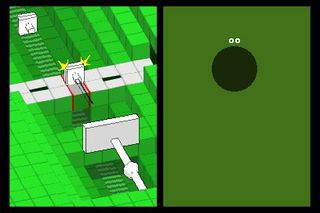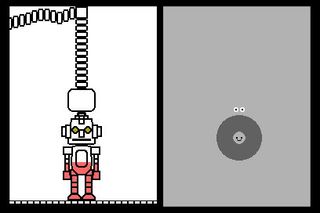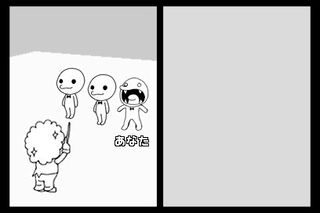Many devoted gamers, for very good reasons, hate casual games. These simple titles are seen as the end of the medium, aimed at the lowest common denominator and sucking development times and money away from "real" games. But now we have Rhythm Heaven, a new music game out to prove that Nintendo can still make a "casual" title that can appeal to hardcore gamers, casual players and really anyone with the ability to press a button.
Rhythm Heaven, known as Rhythm Tengoku in Japan (where it's already a series) is a curious title. In spirit, it's similar to the Wario Ware games, particularly in its cute and offbeat artistic style and humor and in that it is not one game, but a collection of many smaller games. The difference is that the minigames, which in WarioWare would last five seconds, instead last about 30 seconds and are all built around sound, music and - obviously - rhythm.
Many devoted gamers, for very good reasons, hate casual games. These simple titles are seen as the end of the medium, aimed at the lowest common denominator and sucking development times and money away from "real" games. But now we have Rhythm Heaven, a new music game out to prove that Nintendo can still make a "casual" title that can appeal to hardcore gamers, casual players and really anyone with the ability to press a button.
Rhythm Heaven, known as Rhythm Tengoku in Japan (where it's already a series) is a curious title. In spirit, it's similar to the Wario Ware games, particularly in its cute and offbeat artistic style and humor and in that it is not one game, but a collection of many smaller games. The difference is that the minigames, which in WarioWare would last five seconds, instead last about 30 seconds and are all built around sound, music and - obviously - rhythm.

When we started up the title, which requires holding your DS sideways as if it werea book, we learned the seemingly simple move that the gameplay is based upon: the flick. With the stylus placed on the screen, just flick the wrist quickly to pull off this core move. This tutorial led into the first challenge, titled Built to Order. Taking place in a stripped down factory, you must flick a round peg between the round holes of two boards the very moment they line up. Seems easy, but we were just a little off on the first few tries. Then we started listening to the music in the background and realized it was telling us exactly when to flick it - when a specific note in the sequence is hit.
That's the trick to Rhythm Heaven, you can't let your sight deceive you;instead, you must play using your ears at least as much as your eyes. Once we started noticing the beat of the music, we kept hitting the blocks just right every time. We were even able to hit most of them by closing our eyes and just going on the rhythm, like we were training with a Kung Fu master.

After finishing that one, we opened up the next challenge, where we played as one of three guys in a chorus. This time the gameplay was built around the inventive idea that whenever the stylus was on the touch screen our singer's mouth was closed, and the moment it wasn't, he began to sing. Again, we could have made the mistake of looking at the screen for when to act, but we got into the song and learned where our part went. Plus, in this minigame and others, there were obvious yet unobtrusive visual cues that we did it wrong. In this case the two other singers glared at us for messing up.

We seriously can't wait to play through more of these minigames, and it seems like there should be plenty to keep us occupied. On top of that, there are other unlockable distractions and the ability to listen to the game's songs without playing the level, after you've unlocked them by perfectly completing a challenge. So until Rhythm Heaven's quickly approaching early April release date, we'll be focusing on learning to hear the music of everyday life with our eyes closed. Except when driving.
Mar 20, 2009

